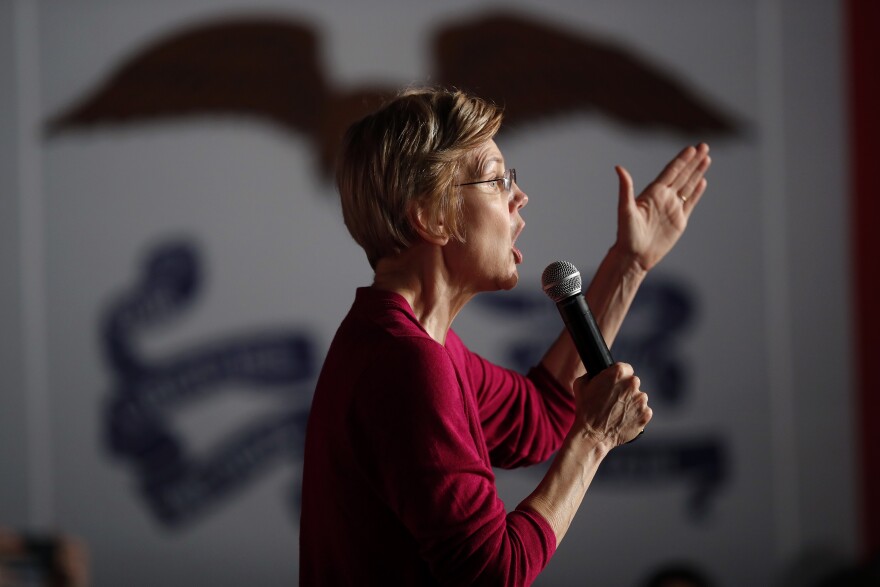This time last week Massachusetts Senator Elizabeth Warren campaigned in Iowa after announcing her presidential bid. Her announcement came a few months after the Oklahoma-native released DNA test results to back up claims of Native American ancestry. The test was taken as an affront to many Native Americans, especially Cherokee citizens, one of the tribes Warren claims ties to.
Warren maintains her mother was part Cherokee, and the issue first came to light during her 2012 Senate campaign. President Trump refocused attention on the issue in 2016, when he began publicly mocking Warren by calling her “Pocahontas” Then, in October 2018, Warren released a video responding to a challenge from the president, who said he would donate $1 million to charity if Warren took a DNA proving her claims.
Warren’s video featured Stanford geneticist Carlos Bustamante, who concluded Warren probably has a Native American ancestor about six to 10 generations ago.
Cherokee Nation was quick to criticize Warren’s move. The tribe’s Secretary of State Chuck Hoskin Jr. spoke on NPR the following day.
“DNA, at best, will tell you if there are markers in your genetic code that trace you to Native peoples in North America and South America. It's not going to tie you to a particular group of Native peoples or particular tribe,” Hoskin said in an interview with Steve Inskeep.
So far, genealogists have not been able to prove Warren has Cherokee ancestors, which is how the tribe determines citizenship. Though Warren has never claimed tribal citizenship, Hoskin says her DNA test reinforced a misconception that Native Americans are one broad racial category, rather than members of hundreds of present-day, sovereign nations.
“Often it is about appropriating our identity and our culture,” Hoskin explained. “Keep in mind, Indian tribes in this country are sovereign nations. We existed before the United States was in existence. You know, we fought long and hard for this status. It’s a legal status that was nearly extinguished by the government of the United States.”
That status underpins federal funding, land rights, mineral rights and special protections for Native American foster children and more. It’s been called into question more than once under the Trump administration. For example, the Trump administration argues tribes should not be exempt from state Medicaid work requirements on the basis that it would constitute race-based preferential treatment.
Brandon Scott, a Cherokee Citizen who lives near Tulsa, also feels Warren’s DNA test exacerbated misunderstandings of Native American identity.
“No one ever says, ‘Oh, you're an American? What percentage American?,’” Scott noted. “I’m Cherokee. The same as I'm an American citizen, I’m a Cherokee citizen. It’s where I live. It's where I'm from.”
But Scott thinks an apology would go a long way.
“I don't discredit her worthiness to be a presidential candidate,” Scott said. “Honestly, her policy, her politics, I agree with a lot of it. I just wish he would apologize to the people that were affected.”
Scott runs the Cherokee Phoenix, the tribe’s official newspaper, and he recently tweeted at Warren, saying, if she were to send a written apology, he’d publish it on the Phoenix’s front page.
I sincerely invite @SenWarren to write an apology and explanation that I will gladly place on the front page of the @CherokeePhoenix (the first and oldest Native newspaper) for the entire @CherokeeNation and world to see. I honestly see that as your first and only logical step.
— Brandon D. Scott (@CNBrandonScott) January 5, 2019
But others aren’t sure an apology would be enough.
“I really feel like the DNA test was a step too far, and that it was really harmful,” said Rebecca Nagle. She’s a writer and full-time Cherokee language learner. Nagle says she also likes Warren’s policies, but, in order to make amends, Warren would need to renounce her claims.
“What Warren needs to say is, that like a lot of other people in the United States, she grew up with a story that her family was Cherokee, and that for a period of time she claimed to be Native American and she claimed to be Cherokee, and it’s something she will no longer claim or defend.”
Nagle doubts Warren will apologize, though.
“I think she scores political points by sparring with Trump. I think that that's part of her political strategy.”
Still, Nagle says Warren’s DNA test video raised important questions in the news about what it means to be Native.
“I really appreciated that during the fallout from the DNA tests native voices were heard and centered in a way that hasn't happened in this ongoing controversy.”
As Warren pursues the presidency Nagle hopes media coverage will feature Native perspectives, rather than framing Warren’s claims in the context of Trump's insults.




